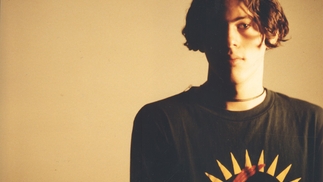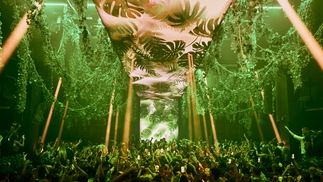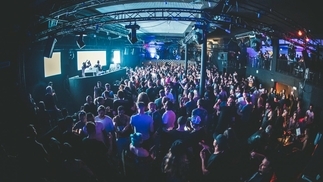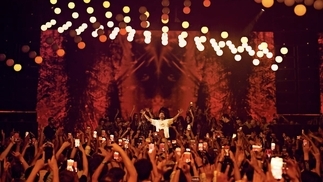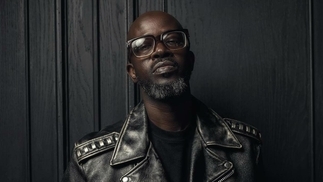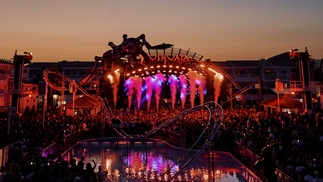How Black Coffee overcame adversity to become one of the biggest DJs on the planet
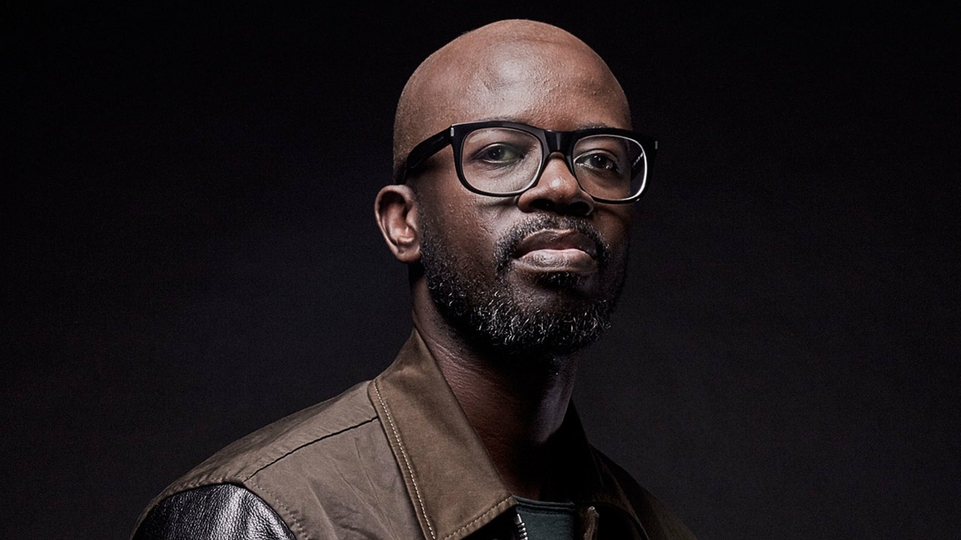
Without bluster or overblown hype, Black Coffee has doggedly worked himself into the position of being not just South Africa’s foremost electronic music artist, but one of the biggest playas on the planet. DJ Mag meets the mild-mannered gentleman in Ibiza — the location of his high-profile weekly residency at Hï — to talk philanthropy, overcoming adversity, and working with megastars such as Drake and David Guetta...
Far from the crowds of Ibiza’s resorts and the kaleidoscopic whirl of its clubs, on a tranquil outcrop overlooking the Mediterranean Sea, a man surveys the view. The shimmering blue water stretching to the horizon suggests limitless possibilities, and for the man — DJ, producer, label owner, entrepreneur and philanthropist Black Coffee, real name Nkosinathi Innocent Maphumulo, Nathi for short — those possibilities have a good chance of being realised.
This artist from Durban, South Africa, has become the country’s most globally celebrated electronic musician, playing to capacity crowds at enormous stadiums, DJing everywhere from underground institutions such as Panorama Bar in Berlin to gigantic festivals like Ultra in Miami, and working with R&B megastars Drake and Alicia Keys. Black Coffee is on an ever-upward trajectory, after making a succession of award-winning albums and launching new artists with his Soulistic label.
DJ Mag is here in Ibiza to digest the next chapter in his remarkable story so far. It’s early in the season, the sky is cloudless, and we’ve come to meet him near Cala Llentia, with its hidden gem outdoor sculpture Time And Space, made by Andrew Rogers. Spread out across the cliff-top scene, it’s a rugged patch dotted with ancient swirls of rocks, a Stonehenge-esque circle of standing stones, and wooden door-frames erected in incongruous fashion. It’s like a strange mirage; a cross between a Neolithic monument and something out of a Spaghetti western.
Maphumulo’s latest big venture brings him here for a second season of the Black Coffee club-night, on Saturdays at Hï: an event at which he hopes to build on last summer’s success and up the ante, with new visuals, production, special guests, and a refinement of his unique sound signature.
“This year we have truly amazing visuals,” Maphumulo says. “We’re creating a mood. Last year we came and plugged in, just played the music, now we’re trying to create an experience on the night with a futuristic, Afro-techy sound. It has all these elements where you can get lost in the music. On Saturdays, the vibe is different.”
For those experiencing Black Coffee’s DJ sets and singular style for the first time, he might seem to have come from nowhere; but his rise has been the result of many years of hard work, dedication and self-belief, overcoming considerable hardships that may have dissuaded others from pursuing a career in music.

JAZZ THING
When we meet, Maphumulo has just flown in from Paris, where he’s attended some high-profile fashion shows. In his relaxed and thoughtful way, he opens up about his gradual, but unstoppable ascension. Into music as a child, Black Coffee liked dancing to local disco and pop, plus international hits from Soul II Soul and Technotronic. He was inducted into DJing while he was still a kid, as part of his cousin’s mobile disco crew.
“He and his friends had a mobile disco soundsystem,” Maphumulo says. “When they were not working, he’d connect it up in his flat and play music. I was curious and would go through the cassettes. Every now and then he’d take me with him, to do the day parties, the beauty pageants, graduation parties. We were using cassette decks then. That’s how it started.”
In parallel to his burgeoning interest in playing dance music, as a teenager he formed the group Shana with Mnqobi Mdabe and Thandukwazi Sikhosana, a group influenced by South African musical traditions as much as contemporary electronic sounds. Though they were signed to the Melt 2000 label, they had little success.
“It wasn’t pop at all,” he says. “It was considered more underground than anything. Radio wouldn’t touch us. We struggled getting played, we struggled getting on commercial shows. It was far from house, too. We never had a song that was faster than 115bpm. It was grooves, yes, but it was very African inspired, quite ethnic.”
His springboard to fame was in 2003 when, after studying jazz at Durban University Of Technology and continuing to DJ, Black Coffee got the chance to attend Red Bull Music Academy (RBMA) inwith legendary, late South African jazz trumpeter Hugh Masekela.
“I wanted to work with someone who was very open-minded, who wanted change and growth,” he says. “The very first time I was in a room with Hugh Masekela, it was at Red Bull. At the time I didn’t even think I’d work with him. I saw the excitement in the room. Guys that were there, mostly not even from my country, knew more about him than I did. Some even came with records they wanted him to sign. That’s why that trip for me changed everything, because when I came back I knew what I wanted to do — including having him on my album.”
Black Coffee’s 2005 remix of Masekela’s song ‘Stimela’ would be an early breakout hit for the DJ/producer, drawing an explicit connection between South Africa’s musical past and future. This hook-up would also suggest a direction for Maphumulo to embark upon: combining his jazz training with the beats he’d become an expert at blending.
“I dropped out of music school, but in my time there, I learned so much,” he says. “I understood the depth of the jazz genre, and on the flipside I also understood dance music. So I was in a very fortunate position. What I wanted to do was bridge the gap, and with my understanding of jazz, be able to simplify it so the dance music fan doesn’t feel overwhelmed by it. “People have occasions, like, ‘On a Sunday I might play jazz’,” he continues. “But if you feel like it, you can play it any day. I wanted to get out of that stigma. To create something that, even a house head could say, ‘Wow’, without saying, ‘Oh it’s jazz, I’m not ready for jazz right now’. At the same time, maintain the same respect with the jazz people, who are so often snobs when it comes to their music being remixed.”
The Red Bull Music Academy stint effectively helped launch Black Coffee’s music career and showed him that he could stand alone; he could make music by himself without needing the affirmation of others. Feeling confident, in an interview at the time, he suggested that in a matter of years he would be one of the biggest producers in the country, a presentiment of what was really to come later.
“I came back a different person from RBMA,” he says. “I wanted to do my own stuff a bit more. I had a clear picture of what I wanted to do. I remember doing an interview while I was there, and they said, ‘Where do you see yourself in two years’ time?’ I said, ‘In five years, I’ll be one of the most important producers of this country’. It freaked me out, it was such a big statement. Why would you put that much pressure on yourself? But it was the truth. It was what I wanted. When I came back from there, I started working towards it. My album came out two years later, in 2005, and it won Best Album [in the SAMAs, for Best Urban Dance Album]. And so did the other ones after it. So what I said there was a prophecy.”

INDIVIDUAL
Black Coffee’s self-titled first album, released in 2005, drew on the considerable history of South African house (see feature on page 33), and also on the funk and Latin infused rhythms of New York producers such as Masters At Work and Joe Claussell and other American artists like Osunlade and Karizma, themselves influenced by African rhythms. ‘Kwanele’ combined distinctively African female vocals with lush, stabbing synth chords, Rhodes keys, looming bass and a shuffling groove. ‘Come Back’ had the jazzy chords and piano vamps he’d vowed to mix with dance beats. Here was a deep house producer with an individual and compelling approach, remarkably assured.
“From the beginning I wanted to make house music the way I feel it, with all the influences around me,” he says. “The records I’ve bought, that I’ve played. ‘I like this four-on-the-floor track, let me do my four-on-the-floor type of track’. People will say, ‘It sounds different, it sounds like you’. That’s something I can’t shake off. It’s the most amazing thing for me to have that African vibe in the work that I do.”
The follow up record, 2007’s ‘Have Another One’, was a similarly bracing pick-me-up, packed with collaborations and songs that indicated Black Coffee’s adaptability. ‘Izizwe’, with late South African musical hero Busi Mhlongo, paired her vocals with lithe guitars and bustling percussion. Elsewhere, and quite different, was ‘100 Zulu Warriors’, made with fellow SA DJ/producer Culoe De Song: an aquatic, techno-influenced instrumental with liquefied synth loops and an unstoppably locomotive beat.
As Black Coffee’s career took off in South Africa, his music was beginning to permeate the European market too, the respected French deep house label Real Tone licensing his cut ‘Even Though’. In 2009, he won two awards for third album ‘Home Brewed’ at the South African Music Awards, for Best Urban Dance Album and Best Male Artist, and in 2011, he performed a special live show at Durban’s Moses Mabhida Stadium, ‘Africa Rising’, in front of 8,000 people.
“That show was special,” he says. “Have you seen the stadium? We did that with a 24-piece orchestra. Just from conceptualising, and seeing it coming together through the rehearsals, the orchestra with the artists, and then to seeing it happen, and being in the stadium, one of the most beautiful stadiums, by the way... it was one of the most amazing things in my career I’ve ever done.”
TRAGEDY AND TRIUMPH
Black Coffee went stratospheric with the subsequent ‘Africa Rising’ album and live show: a DVD and triple CD that was certified double platinum in a month. All of this Maphumulo had achieved despite a serious disability. He no longer has the use of his left arm, which was paralysed in a serious car accident when he was just a teenager. During the celebrations after South African political leader and anti-Apartheid campaigner Nelson Mandela was released from prison in February 1990, Maphumulo was caught up in the festivities and was struck by a vehicle that ploughed into a crowd of revellers.
“It was like the World Cup,” he says. “There were people celebrating on the streets. The crowd came past my house and me and my cousins went to join them. My cousins went back and I didn’t, I stayed out till the early hours of the morning, to a point where I was scared to go back home, because I knew I would be in trouble. Someone came out of nowhere and drove through the crowd, and 35 people got injured. Two passed away, including the driver of the car.”
After his recovery, Black Coffee made a decision: to not let his disability ever hold him back. He’s worked doubly hard to get to where he is now, and even holds the Guinness World Record for the longest ever one-handed DJ set, after playing for 60 hours non-stop at Maponya Mall in Soweto. “It has changed my outlook totally,” he says. “It’s taught me so many lessons. It’s also taught me to really work hard. There was a big mind-shift. It took a while, when I was younger. It really hit me and I understood at that point that I can’t just do anything — anything I do, it will be quite limiting. The only thing I know is music, and that’s what I needed to put my everything on. It changed my focus. For me to get to wherever I want, I need to put in the hours, work twice as hard, than someone who is ‘normal’. For me, it was a positive thing. If you were to ask me, ‘Do you wish it never happened?’ I would say no. It came with so much.”
To help others with disabilities in South Africa, Maphumulo has launched the DJ Black Coffee Foundation: one of several philanthropic initiatives he has devised to give back to people in the country. “We’ve done different things with different [care] homes, but there is a lot of help needed. My country needs a lot of help. The last thing we were doing is a bursary, taking a kid to college for every year until they finish. We’re doing other things, as much as we can.”

LEVEL UP
After the big breakthrough of ‘Africa Rising’ came 2015’s ‘Pieces Of Me’ album, a platinum seller in South Africa, yielding several big singles released via Ultra Music in the States. Songs such as the 2016-released ‘Come With Me’, featuring the vocals of Mque, were slicker, more polished, suggesting a shift towards a more commercial sound — yet Black Coffee’s polyrhythmic percussion remained, along with lush African guitar and an inviting sense of space, making it far more danceable than your typical chart hit. He’s found a way to appeal to the pop market while keeping his deep house roots intact, something helped by the underground credibility of his Soulistic Music label which, along with his own records, has been an outlet for upcoming South African producers. The highly regarded Culoe De Song (who has released on Innervisions and Mule Musiq) has put out a steady stream of albums through the label, while Zakes Bantwini, Tumelo and Sai + Ribatone have also had success via Soulistic. Black Coffee has decided that,for now, Soulistic will be an outlet for his own material.
“I think what I want to try and preach is for artists to start their own [label] and sign themselves, so they can own their masters and have no middleman, which is why I remain on Soulistic Music, because it’s my own,” he says. “In that way, it’s easier to have music out, it’s easier to have business, it’s easier to get better revenue without anyone taking most of your money. Soulistic Music will remain, and everyone that’s there now, we will try to help them create a structure.”
To this end, Maphumulo has devised a potentially revolutionary new online music portal. Gumbox, he hopes, will become a new platform for pan- African artists to earn money in an independent way from their music.
“It’s like Spotify, but it’s more specific to an African market,” he says. “Even in the way we want to do it. That’s what we want, to create a platform that understands the people that are consuming. We will have all different types of payment systems because Gumbox is for the world to come in and buy music, it’s not just for Africans. We want to create a home for our music, in any kind of genre.”
What Black Coffee wants to do is to bypass the interference of major labels or tech giants, who will inevitably pocket much of the profits from the music, while artists are left by the wayside. “We’re rewriting the music industry books in Africa,” he says. “We’ve always been told what to do, someone comes and puts their tents up and says, ‘Hi, I’m Sony, from America, sign here, this is how it will work’. ‘I’m Universal, I’m BMG, EMI’. We’ve just been plugging into people’s plans. It has been great and we have learned so much — but I feel like it’s time now to understand our strengths, and start planning our future. Our future can’t be planned by someone sitting in Stockholm. We also understand how we consume things. Spotify just landed in South Africa, and everyone’s like, ‘Oh yeah, they’re here to save us’. I’m like, ‘Cool, I’m on there too, but it’s not the answer’. The answer is only gonna come from us."
As the most globally visible South African star as far as electronic music is concerned, Black Coffee feels a sense of responsibility to his country. Having spent years and much effort establishing himself, learning the pitfalls of the industry (visible in the flecks of grey in his beard), he sees his position as providing an opportunity to help others, rather than pulling the ladder up behind him.
“It comes with age and time,” he says. “This is why I have all these projects I’m doing, because I understand the impacts they will have. It’s taken me so long. When I did the Black Coffee Foundation, I wasn’t ready yet, but I still went for it. I did a few small things, fixed a couple of homes, found wheelchairs for people. We did what we could. What I learned from that experience is, you first need to fill up your own cup. Then you have the strength to assist. I’ve seen so many artists jumping to assist when they can’t even help themselves. Then everything collapses.”
A further philanthropic venture, the FAM Academy in Johannesburg, is his next big extracurricular project: a college dedicated to fashion, art and music, with American fashion designer Virgil Abloh (who works for Louis Vuitton) just one of the high-profile names involved.
“My colleagues are involved in fashion and art,” he says. “We were looking at a premises and wefinally got a place. But upon having back and forth conversations, we’ve realised that the building that we have is not enough. I’m trying to convince everyone. Not far from it is a big piece of land. I’m saying to the guys, ‘Just buy the land’. It’s quite expensive, but we can raise money to do something really epic. What we wanna do is big, it’s really big. We might as well just go all the way. FAM is still a brainchild, but it’s something that is very close to my heart. I want to see it happening.”

COLLECTIVE EFFORT
A spirit of collaboration and co-operation underpins so much of what Black Coffee does. While he’s involved with, or has invested in, numerous start-ups, apps and real world businesses in true entrepreneurial fashion (see Business As Usual on previous page), he’s also continuously worked with other artists on his records, giving equal billing to big stars and newer artists. So while he’s linked with Hugh Masekela more than once (see also his appearance on Louie Vega’s Vega Records with the emotive vocal jewel ‘We Are One’), and long- time house vocalist and former Abstract Truth member Monique Bingham, he’s found time to give exposure to South African vocalists such as Bucie and Shekinah too. “I love collaborating with others, because they always bring something I don’t have,” he reasons. “I’ve been blessed with a gift in music, but I also understand how far I can go, and wherever I end, I bring someone else to take it to the next level. On my next album, it’s what I want to do. I want to work with a lot of people, even on production.”
Effectively now, Black Coffee’s records can become a showcase for new talent. “I’ve sold so many records, I’m at a point where I don’t have to prove anything to anyone,” he says. “I’d rather create a platform for other people.”
As a DJ too, Black Coffee is always searching for fresh artists to populate his sets. While they might feature tracks by Berlin house and techno specialists Henrik Schwarz or Dixon, or New York sensations Bedouin, they’re mostly composed of young South African producers: one way that Maphumulo stays a step ahead of the competition. He’s particularly impressed by the next wave of artists coming up at the moment (see above).
“Right now, it’s the younger ones, man,” he says. “We’ve opened this WhatsApp group becausewhat’s been happening is, I’ve been finding music, bits and pieces from different people. I asked this other DJ friend of mine, Merlon, if he can connect all of us, because most of these guys are from Durban. The kind of music these guys are making, it’s what I play the most right now. You can’t find it on Traxsource or Beatport, it’s not available. But it’s the most amazing stuff.”

SAY Hï
It’s the kind of music that you can expect to hear at his Hï residency, which this year is bolder and bigger, as the new club (which occupies the same area as the now-closed Ibiza institution Space) establishes itself as a world-beating venue in its own right, and punters catch on to Black Coffee’s unique Saturday night offering. So far this season, he’s been joined by Damian Lazarus, Henrik Schwarz, Mandar and Jamie Jones, plus SA’s rising Themba and Da Capo; to come in August, there are on-point guests such as Honey Dijon, Benji B, Lauren Lane and Âme. Central to the night’s appeal, though, is Black Coffee’s original sound.
“What I play is not music you can go and find easily, and get used to,” he says. “You can come and experience it here. It went from that, to understanding that now we have quite a strong following. This year we had to prepare and see what else we can take on board. We try to bring as much texture and colour and beauty, vocals. It’s the most underground music, unreleased stuff. Now people are coming here for it.”
If Maphumulo’s self-confidence seems unshakable, that hasn’t always been the case, especially when it’s come to playing in Ibiza. Before his first gigs he experienced a sense of trepidation, unsure of how his brand of house music would go down.
“It’s been one of the biggest things,” he says. “I’ve been coming here for the last three years, playing for different clubs. This is my fourth year. To start with, I’d only seen a certain side of the island. I was very afraid.”
Even now, Black Coffee won’t become complacent, arguing that he’s not quite as well-known to Ibiza club-goers as some think. “I’m still nervous and under pressure. One example is, my team was saying, ‘This year, how about we put a lot of artwork on the billboards and maybe a few Black Coffee pictures?’ To them, it’s like it’s done, we’re in. To me, it’s not. You might think my face is recognised, but I don’t think so. We still need to be out there, so we have 80% pictures of Black Coffee and 20% artwork.
This drive to up the stakes every time keeps Black Coffee focused and sharp, and his mind is already on his next manoeuvres. Collaborations with big US rap and R&B stars have been suggested, after Drake sampled a sizeable chunk of Maphumulo’s track with Bucie, ‘Superman’, for his tune with Jorja Smith, ‘Get It Together’, last year. Overall, he reckons it was a positive thing, though a few fans balked at the Canadian megastar’s treatment of one of their favourite songs.
“It was good, it introduced my name to a wider audience,” Black Coffee says, in a measured way. “We didn’t have to sit down in the studio, they took a song I had made nearly 10 years ago and sang over it. It did give me more exposure to some extent, but there were mixed feelings from the fans, they were like, ‘No, don’t mess that song up’. Still, it deserved another chance, so people who didn’t know it went back to it — ‘Let’s hear the original’.”
A new album is promised soon, but before that, there’s a single on the way that might surprise fans of his deep house material especially: a collaboration with one of the biggest EDM and pop stars in the world.
“A month ago, I was in the studio with David Guetta and we did a song, and it looks like, it’s not confirmed yet, but we’re going to hopefully have London Grammar on it. I’m really looking forward to it — it’s a song that for me changes everything in terms of musical approach. It’s something you wouldn’t expect from me, but also something you wouldn’t expect from David Guetta either.”
Black Coffee has big ambitions, and he’s not going to let preconceptions or genre restrictions hold him back. That cliff-top view, the horizon leaning forward, really does offer a world of possibilities. “I’m creating new work based on where I’m at at the moment,” he says. “What I’m feeling and what I think the world needs to hear from me.”

